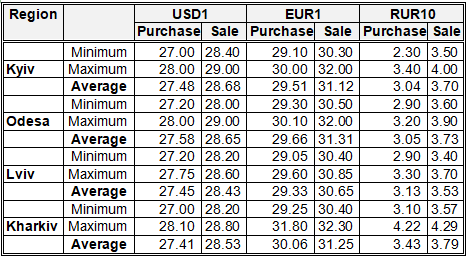
Ukraine may save $5-6 billion on energy imports in 2020 due to a 50-60% reduction in prices for energy products, which account for 20% of the country’s imports, NBU Deputy Governor Dmytro Sologub has said.
“Our balance of payments shows that there are both positive and negative influence factors in our current account. First of all, this is a fall in oil prices, energy products, which account for 20% of our imports, compared to $12 billion in 2019. A fall in oil prices, a decrease in gas demand may lead to the fact that this year we will save $5-6 billion,” he said at an online briefing on Friday.
Sologub said that the epidemiological situation has led to a reduction in tourist travel.
“Last year, tourist trips of Ukrainian citizens amounted to $8 billion, and we can also expect a significant reduction,” Sologub said.
According to him, the National Bank expects a slight decrease in food prices, which account for more than 50% in Ukrainian exports. To date, the fall in food prices is much lower than for energy.
“As we understand it, even in a crisis, especially when sitting at home, people will consume food and this is the last thing they will refuse. Therefore, we expect that the demand for our export products will preserve, and if it decreases, then insignificantly,” the banker said.
He said that now there is a decrease in money transfers to the country from Ukrainian citizens working abroad. The National Bank expects that the reduction in the indicator will also be less than in energy products.
“Most likely, this influence will be temporary, as economic recovery in Poland, the Czech Republic, Italy will lead to the resumption of remittances,” he said.

Pharmaceutical doubled liability company Interchem will send over UAH 2.5 million to equip Odesa infectious diseases hospital with medical equipment and medicines. Interchem Director General Anatoliy Reder told Interfax-Ukraine that the company took into account the real needs of the hospital.
“Interchem joined in the fight against coronavirus. We tried to take a balanced approach, listening carefully to the needs of the infectious diseases hospital, and did not begin to deliver artificial lungs ventilators, because, according to doctors, a sufficient amount of ventilators was available. We decided to meet urgent needs which are no less important,” he said.
In particular, the company purchases a portable ultrasound machine for the hospital, which will minimize the movement of infected patients in the clinic and greatly facilitate diagnostic procedures for doctors.
In addition, Interchem buys oxygen concentrators, pulse oximeters, and other necessary equipment for the infectious diseases hospital.
“We will listen very carefully to the needs of the clinic and, above all, and respond to the requirements of medical professionals,” he said.
Reder also said that the company transferred the antiviral drug Amixin to the Odesa infectious diseases hospital, which is used, in particular, to protect medical personnel.
“We are by no means claiming that this is a drug to treat the coronavirus diseases COVID-19 circulating now, but we know for sure: this is an antiviral drug that will prevent medical personnel from getting ill with ordinary viral infections,” he said.
According to Reder, Interchem switched to a seven-day workweek because of the increased need for medications, not just from the antiviral group.
“Manufacturers today received the list of the Ministry of Health with medicines that hospitals should be provided with in accordance with WHO recommendations. This list contains drugs manufactured by Interchem,” he said, noting that this is, in particular, about painkillers, anticonvulsants and anxiolytic drugs.
Reder also said that the entire staff of the company is being transported to and from work by company buses.
“In some ways, it is easier for us, we didn’t have a problem with the delivery of people, because we always bring staff by our buses,” he said.
Reder also said that Interchem will reformat production processes in order to increase the production of the most popular drugs today and reduce the production of less relevant ones.
Pharmaceutical doubled liability company Interchem is one of the leading pharmaceutical companies in the country.
Ukrainian banks’ cash exchange rates on 19/03/20

Source: Interfax-Ukraine
National bank of Ukraine’s official rates as of 20/03/20

Source: National Bank of Ukraine

Ukraine from March 1 through March 17, 2020 increased imports of food by 40,000 tonnes year-over-year, to 158,000 tonnes with the cost being $211 million, the State Customs Service said on Thursday. “Some 40,000 tonnes of food products more were brought to Ukraine during 17 days of March compared with the same period in 2019. In general, food imports amounted to 158,000 tonnes worth $211 million. This is almost 8,000 completely filled trucks carrying 20 tonnes,” the customs authority wrote on its page in the Facebook social network.
According to the authority, the supply of cheese, eggs, honey tripled and amounted to 3,177 tonnes worth $13.6 million, imports of finished products from grain, flour, flour confectionery products rose by 86%, to 6,166 tons worth $12.3 million.
Deliveries of vegetables, some edible roots and potatoes increased 138%, to 38,900 tonnes worth $20.4 million.
The milk and milk group of goods showed growth by 163%, to 921 tonnes worth $1.2 million, fish imports – by 73%, to 2,493 tonnes worth $14 million.
Deliveries of coffee, tea, mate and spices increased by some 33%, to 1,293 tonnes worth $4.3 million, extracts, essences and coffee concentrates, syrups, sauces, soups, etc. grew by 23%, to 3,854 tonnes worth $25.1 million.
Import of fruits and nuts also increased slightly, by 3%, to 45,837 tonnes worth $33.9 million.